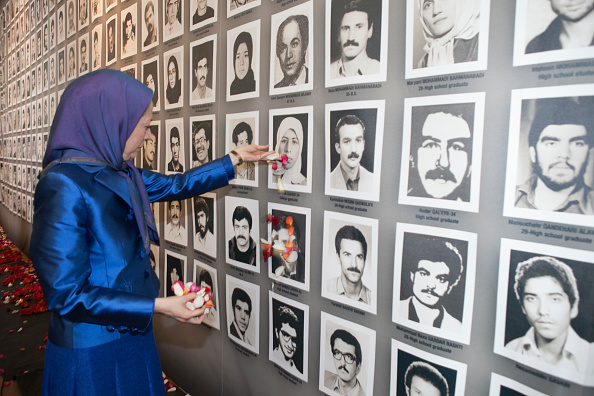Amnesty international recently published a report titled “Trampling Humanity” depicting in detail the atrocities committed by the Iranian regime security apparatus following nationwide protests in November 2019 after the Iranian government announced a sudden significant rise in the price of petrol. “The Iranian authorities waged a campaign of mass repression that led to the mass arrest and detention of thousands of men, women and children and arbitrary detention, enforced disappearance, torture and other ill-treatment,” the report said.
The report comes after a huge campaign was launched by Iranian activists on social media using the hashtag “Don’t_Execute” following the sentencing of three young Iranian Amirhossein Moradi, Mohammad Rajabi and Saeed Tamjidi to death by the Iranian Judiciary in connection with in the nationwide protests that took place in November 2019.
According to amnesty international, Mohammad Rajabi and Saeed Tamjidi have said they were kicked, hung upside down and repeatedly beaten. Amirhossein Moradi has said that interrogators tortured him through beatings, electric shocks and standing on his chest. He also reported painful kidney problems as a result of the torture. Despite this, he has been denied medical care. His “confessions”, which he has said were given under torture, were used as evidence by the court to convict all three.
Everyday this brutal regime proves its disdain for human rights. Iranian wrestling champion Navid Afkari was handed two death sentences by Iran's Supreme Court along with six years and six months in prison and 74 lashes, according to Persian-language broadcaster Iran International. His brothers Vahid and Habib Afkari were sentenced to 54 and 27 years in prison, respectively, and 74 lashes.
Later this year an Iranian diplomat and three accomplices will face trial in Belgium on charges of taking part in a plot to bomb a rally near Paris. Assadollah Assadi, a senior official of the Iranian regime’s Ministry of Intelligence and Security stationed in the Iranian embassy in Austria, handed over a powerful TATP bomb to Amir Saadouni and Nasimeh Naami in Luxembourg on June 28, 2018, to bomb the opposition gathering in Villepinte. This terrorist plot was uncovered and thwarted in its final stages.
Iran has an impressive record in getting away with crimes against humanity. Following a fatwa handed down by the Iranian regime’s Supreme Leader Ruhollah Khomeini in mid-July 1988, ‘Death Commissions’ were set up in prisons across Iran that sent thousands of political prisoners to their deaths.

More than 30,000 political prisoners, mostly affiliated with the People’s Mojahedin Organization of Iran (PMOI or MEK), were secretly mass executed over several months in 1988 after mock trials lasting just five minutes. Their corpses were doused with disinfectant, packed in refrigerated trucks, and buried at night in mass graves across the country.
The leader of the PMOI Maryam Rajavi told Majalla that by issuing a fatwa to massacre the political prisoners, Khomeini sought to eradicate the entire generation of the People’s Mojahedin to guarantee the survival of his regime, much like the Mongols who massacred millions of people. In his own handwriting, Khomeini wrote: “Any one at any stage, if they remain faithful to the Mojahedin, his/her sentence is execution. Destroy the enemies of Islam immediately.”
Survivors of Iran's 1988 massacre of political prisoners, international legal experts, and human rights and political dignitaries held a webinar in August appealing to the United Nations and its Member States to carry out an independent investigation into the massacre.
Baroness Verma of the UK House of Lords said at the event: “One of the reasons for this deterioration is the decades-long impunity that the regime officials have enjoyed and are enjoying at home and abroad.”
Former UN human rights official Tahar Boumedra, who represented the London-based NGO ‘Justice for the Victims of the 1988 Massacre in Iran’ (JVMI), said that the persecution of political prisoners in Iran on the ground of their political, religious and ethnical belongings is an “ongoing crime” that must stop and the perpetrators must be brought to justice.
“After 32 years since the 1988 massacre of political prisoners, it is clear that the Iranian officials are unwilling to act on the calls of the UN to investigate and reveal the truth,” he said.
"As most Iranian suspects in the commission of crimes against humanity are already listed for terrorism offences and other crimes under international law by EU member states, USA, Canada and others, it is possible for a national court of these states to accept jurisdiction over an act categorized as a crime against humanity. Although, political considerations are generally taken into account in accepting or rejecting such a jurisdiction, it is the responsibility and the raison d’être of the human rights defenders to insist and to facilitate prosecutions and make them happen, by searching, documenting the evidence and placing it at the disposal of the jurisdictions willing to prosecute.”
Rajawi told Majalla: “It is now time to expand a movement to seek justice over the massacre of political prisoners anywhere and anyway we can. A movement for justice is, before anything else, a declaration that the regime’s supreme leader Ali Khamenei is definitely a criminal. Khamenei and his accomplices are criminals because they are the highest authorities directly responsible for the 1988 massacre.”
Rajawi urged the United Nations and the Security Council to facilitate the political and legal arrangements so that the international community can prosecute the leaders of the Iranian regime for perpetrating crimes against humanity.
The Iranian regime has used terror as a tool in order to subjugate its own people to a dictatorship, but also in order to advance its strategic interests in the region. There is only misery, wars, destruction and sectarian tensions whenever and wherever the Iranian regime is involved. Today more than ever this regime should be held accountable if Iranians and the people of the region are to have a better future.









